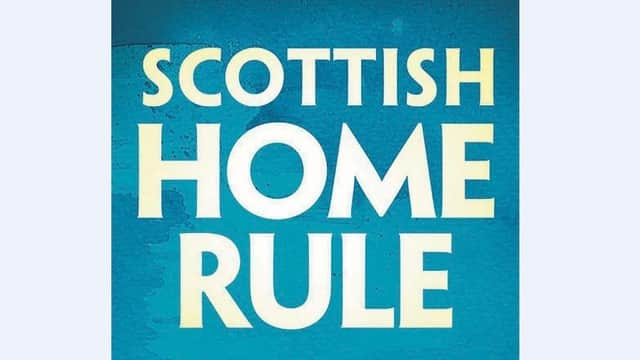Book review: Scottish Home Rule, by Ben Thomson


In 2016, when Britain voted by the narrowest of margins to leave the European Union, compromise models for our future relationship with the EU were so freely available that it seemed almost certain that one of them would prevail. The Norwegian model, the Swiss model, the Canada Plus model – all of them were sitting around, just waiting to be smoothly adapted and implemented; and much will doubtless be written, down the years, about the speed with which they were all marginalised and dismissed, as we began our painful four-year journey towards the hardest Brexit imaginable.
When Scotland voted to reject independence in 2014, by contrast, the only compromise plan on the horizon was Gordon Brown’s now-notorious Vow, a hasty offer of enhanced devolution published on the front of the Daily Record a few days before the vote, and then gradually abandoned, after 2016, by all three main UK parties. Ben Thomson’s new book Scottish Home Rule: The Answer To Scotland’s Constitutional Question is a serious, commendable and occasionally elegant effort to fill that gap, with a plan that seeks to offer a middle way in the struggle between unionism and independence that currently divides Scotland.
Advertisement
Hide AdA former chief executive of Scottish investment bank Noble Group, Thomson has combined his career in the financial sector with decades of civic activity and public service, notably with the think-tank Reform Scotland, and as a former Chair of the National Galleries of Scotland. He belongs to the grand old Liberal tradition of support for radical UK constitutional reform, as a response to Scotland’s discontents; and in this book, he sets out the case for a full-blown Home Rule settlement that, while leaving Scotland as part of the UK, would greatly increase Scotland’s autonomy, and guarantee in a new written constitution the status of the Scottish and UK governments as joint and equal holders of sovereignty over Scotland.
The book falls into three main sections, beginning with a useful if incomplete short history of movements towards Irish and Scottish home rule, continuing with a thorough and detailed account of how a Home Rule settlement would work, and ending with suggestions for how Scottish policy might be improved under such a settlement. The three principles of Home Rule, he suggests, should be subsidiarity – the taking of decisions at the lowest level possible, close to the people – along with full fiscal responsibility, and mutual respect between different levels of government, enshrined in a written constitution.
And it is precisely this language – of reasonable agreement and mutual respect – that alerts us to the reasons why Thomson’s plan is unlikely to find substantial political support any time soon. “All major parties support, at a minimum, current levels of devolution,” Thomson writes confidently, apparently unaware that most Westminster MPs, in the illiberal post-Brexit climate of militant British nationalism, now seem either indifferent to the current devolution settlement or openly hostile to it, as the passing of the recent Internal Market Bill makes clear. Under these circumstances, Scotland’s political debate has likewise become more polarised, with Labour and the Liberal Democrats increasingly mirroring the Tories’ “patriotic” intransigence, and few in Scotland now seeing much scope for compromise between that dogmatic unionism, and full Scottish independence.
At this point in UK and Scottish politics, Thomson’s Home Rule plan seems like an idea comprehensively overtaken by events. Yet it remains true, in politics, that he (or she) who drafts, often finally wins the chance to legislate. Thomson has drafted his plan, in defiance of the times; and it would be a poor observer of politics, and its occasional rapid shifts, who would entirely rule out the possibility that one day, this book’s time may come, and Thomson’s carefully crafted scheme find itself centre stage, as exactly the compromise plan that history suddenly, and unexpectedly, demands.
Book review Scottish Home Rule: The Answer to Scotland’s Constitutional Question, by Ben Thomson, Birlinn, 176pp, £9.99
A message from the Editor:
Thank you for reading this story on our website. While I have your attention, I also have an important request to make of you.
Advertisement
Hide AdThe dramatic events of 2020 are having a major impact on many of our advertisers - and consequently the revenue we receive. We are now more reliant than ever on you taking out a digital subscription to support our journalism.
To subscribe to scotsman.com and enjoy unlimited access to Scottish news and information online and on our app, visit https://www.scotsman.com/subscriptions
Joy Yates, Editorial Director